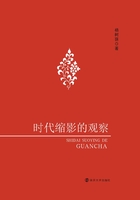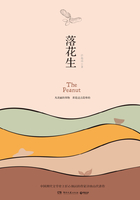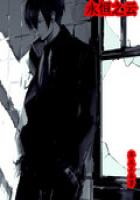Galapagos:Farewell, Big Brain
Galapagos signifies important progress of Vonnegut's ecological humanist ideas in that it creates a world in which the ideals of the immersion of human beings in nature and their reconciliation with other animals are realized。 If Slaughterhouse-Five succeeds in breaking down the species barrier, The Sirens of Titan and Galapagos move one step further in bringing the animals and humans closer, by means of transformation;if the transformation in The Sirens of Titan is in nature metaphysical, realized mainly through a choice of life on the individual level, in Galapagos it is defnitely more physical, thorough, and on a wider scale。In the future world projected in the novel, the entire human race is transformed, by means of evolution, an irresistible and irreversible process。Morphologically as well as physiologically, human beings are virtually unrecognizable。They are no longer the upright primates that can talk and think and use different tools with their hands or create various ideas or contrivances with their brain。They become, instead, amphibious creatures covered with fur, their arms turning into flippers in which“the hand bones are almost entirelyimprisoned and immobilized”,and their mouths becoming beaks to catch fsh with。More signifcantly, their brains are much reduced in size so that their skulls become more streamlined and good for swimming(G 185)。
Critics respond to such a projection of the future humans in a vast range of opinions, from disgruntled rejection to enthusiastic embracing。 R。Z。Sheppard fatly dismisses it as“a cute idea but a literary dead end”(90)。Neil Berry maintains that“Vonnegut ranks low as a philosopher”and declares that Galapagos is just“a protracted piece of whimsy, laborious and unrewarding”(58)。Most of Vonnegut's supporters applaud the book warmly, recognizing its quality that marks Vonnegut's affinity to Mark Twainand ranking it among his best, side to side with Slaughterhouse-Five, but they, too, disagree signifcantly on the understanding of the book's central concept of the human retrograde evolution。Some acclaim it as a clever and plausible solution to the human errors, while others doubt its ethical appropriateness;some think the solution points to an Edenic future for humanity, while others feel it“somber”,“chilling”and pessimistic(Allan 1991:152)。Todd F。Davis thus sums up the quandary readers face,“[A]t novel's end we are left wondering which world is better:a world of the most base biological functions that poses no threat to life or a world of free will driven by an intellectual capacity that threatens humanity's very existence”(117)。
For him, the future world presented in Galapagos is far from inspirational。Although there is no more potential for destructiveness in the furry, seal-like creatures, he notes, they are also devoid of creativity。“Nobody, surely, is going to write Beethoven’s Ninth Symphony”,he quotes from the book(G 259)。Such a life offers nothing but boredom, and he believes even Vonnegut agrees。Thus, he argues that in solving the problem of moral error Vonnegut“also destroys what makes us human”and concludes that“Galapagos really solves nothing”。To modify his criticism, Davis reiterates his conviction in Vonnegut’s devotion to humanity as a“postmodern humanist”,that“at all times and often against his bitter judgment, Vonnegut remains an advocate of humankind”(116,117)。
The perplexity Davis encounters is indeed commonly shared。 Freese thinks the book typifes Vonnegut's inimitable mixture of cynical pessimism, black humor, and bourgeois sentimentality, concluding that“the novel's action offers no reason for humanistic optimism”(2009:600)。In the 1987 interview, William R。Allan expressed his uneasiness with a question:
WRA:[……]Is it a stance, or can you really imagine the loss of the complexity of human thought?To me, that would be a tragedy。”
KV:I don't see why。
WRA:Clearly, we wouldn't know it, wouldn't recognize its happening, but there's something in me that rebels against that idea。
KV:Well, having seen where we're headed, I don't want to go that way anymore。(CKV 292)
As we can see in the interview, Vonnegut's answers to the questions are firm and direct:the world of seal-like people is not meant to be a tragedy but a remedy to the mistakes humans have made。 Earlier in the interview, he tells Allan that he does not think the change humans undergo in the novel should be termed as“de-evolution”,Allan's choice of word。
I consider it evolution。 It's simply change。[……]Perfectly intelligent change in the right direction。Equire said there are no record of de-evolution—I've never even spoken the word。Peopleso insist on progress because they really want to believe that we're headed somewhere。(CKV 291-2)。
From the conversation we can see the advantage Vonnegut demonstrates as an ecologically-conscious humanist writer, in comparison with the critics。 The repulsion that Davis, Allan, and Freese feel at the idea that humans would“devolve”into a seal-like creature is largely owing to the deep-rooted assumption that humans are superior animals and entitled to enjoy the privileges of reason, speech, and creativity。They find it hard to accept it as truly possible that we would“degrade”into the same level as the other,“lower”animals, become a link of nature's food chain, and subsist on base, animalistic instincts。If the prospect is inevitable, it surely is humanity's tragedy。Davis'protests that Vonnegut destroys“what makes us human”and that the primal mythic innocence Vonnegut portrays represents a state that appears“inhuman”(116)in many aspects reveal in effect the anthropocentric bias common among mainstream critics。In this sense, even though Davis has noticed that Vonnegut's humanism differs from the classic humanism, his label“postmodern humanism”fails to capture the unique properties Vonnegut's humanism contains, since it is still, according to the way Davis understands it, a limited, exclusive vision focused on the interests of humanity only。
Vonnegut proves to possess a much broader mind and more embracing compassion。 As a humanist with a strong sense of ecological commitment and one who“always had a warm heart for animals”(Reed 1990:63),Vonnegut never bears any contempt or prejudice against other animals。On the contrary, as is shown in the proceeding chapters, the animal world is always portrayed as one of higher order than that of the human world。First of all, he sees nothing wrong or disgraceful to live like a seal。In another interview, he describes in full glee the charm he enviously noted in the life of the smart and good-humored animals:
Well, if you saw the seal and sea lions on the Galapagos Islands, that's the life you would want。 Gee, it's an incredible, amusing life they have。They play practical jokes on the other animals;they don't have that much to do。I mean, they're quite smart, and they've got a lot of time on their hands。Sharks are what they have to look out for—and killer whales。A lot of them have scars because they’ve been hit by big fsh。There are these big iguanas, who with great labor, will swim out from shore, eat seaweed on the bottom and bob up to the top to swim back to the islands。Well, the seals will come and catch them by the tail and drag them back。(Laughter)They let them go almost on shore and drag them out to sea。And if you go swimming there, they will come underneath you, look up at you and swim all around you。(CKV 258)
There is all heart-felt delight and adoration in the deion, without a single hint of mean mocking or belittling。 The joyful and idyllic picture in effect echoes Vonnegut's proclaimed preference to live with alligators instead of people, which entails no necessity to talk or think。According to the deion, the life of the seals is not at all boring but full of mirth and fun。The seals are not dull animals either, but very smart and playful, so there is no worry that“nobody is going to write Beethoven's Ninth Symphony”。Other forms of creativity and entertainment will emerge, but never the kind to invent the atomic bomb, never to“tell a lie, or start a Third World War”(G 259)。Similar deions are scattered in the novel, creating a total effect of peace, innocence, simplicity, joy, and contentment。Moreover, there is a special emphasis on the future humans'advantage over those of olden times:easier ways to catch fsh for food(G 34),more acute underwater sense of smell(G 79),shorter dependent childhood(of nine months)(G 122),and easier, routinely but as intense sexual relationship(G 226)。Most important of all, nobody will be lying(G 99),and they will never use a weapon or wage a war(G 146-50),or practice slavery(G 176)。On the whole, therefore, becoming seal-like, or becoming animalin general, is not presented as a dark, bleak prospect to be dreaded of。Instead, it is where salvation lies。
Furthermore, Vonnegut is not simply wielding his science fiction imagination when confguring such a picture of the human future。 He has the solid basis of hard science。As is well circulated, before writing the book, Vonnegut read extensively on biology and evolutionary science and actually made a field trip visit to the Galapagos Islands in 1982,for the same duration of two weeks as Charles Darwin's visit in 1835(Freese 2009:563)。Allan makes an important observation that in Galapagos Vonnegut uses hard science that has nothing to do with science fiction writing(1991:149)。Vonnegut is deadly concerned about the authenticity of the book's scientifc speculation, which explains his great delight at the letter from Stephen Jay Gould, a renowned Harvard zoologist。
“He thought it was a wonderful roman a clef about evolutionary theory and also proves how random the selection is。He said that the fur-covered baby was a good mutation, that it was a common one。So it's reputable scientifcally;I worried as much about that one as anything”(CKV 252)。Gould also publicly confirmed Vonnegut's self-assessment of Galapagos'scientific reputability, assigning the book to his students in science courses“as a guide to understand the meaning of contingency”(qtd。in Freese 2009:581-2)。Incidentally, a scientific discovery in 2011 from the University of Cambridge indicates that the human brain would shrink in size in the future because the human brain has reached its natural limits for further development and the human body can hardly supply the huge amount of energy it demands for the intricate thinking process。With much probability, what Vonnegut projects as science fction may one day come true。
Therefore, the future image of the furry, seal-like, small-brained humans cannot be taken lightly only as a humorous rhetoric or an exhibit of whimsical mischief, not even simply as black humor, which denies its literal/scientific significance。 Indeed, there are in the image serious messages in both the metaphorical order and the realistic domain。
Metaphorically, by portraying the future humankind as small-brained creatures, Vonnegut openly expresses his hitherto guarded anti-intellectualism and brings his critique of humanity to consummation。 There is little secret in this。Leo Trout, the ghostly narrator who has been watching the human activities for a million years, makes it the center of our concern at the outset of the story:
It was hard to believe nowadays that people could ever have been as brilliantly duplicitous as James Wait-until I remind myself that just about every ***** human being back then had a brain weighing about three kilograms!There was no end to the evil schemes that a thought machine that oversized couldn't imagine and execute。
So I raise this question, although there is nobody around to answer it:Can it be doubted that three-kilogram brains were once nearly fatal defects in the evolution of the human race?
A second query:What source was there back then, save for our overelaborate nervous circuitry, for the evils we were seeing or hearing about simply everywhere?
My answer:There was no other source。 This was a very innocent planet, except for those great big brains。(G 8-9)
In light of this introduction, the novel, particularly Book One“The Thing Was”,can be taken as a book of judgment of all the evils conductedby“the oversize human brain”,which the narrator declares as“the only real villain in my story”(G 270)。 He wastes no opportunity to indict this monstrous villain for all the troubles humanity faces:the irresistible urge to commit suicide in Mary Hepburn, the newly widowed school teacher;the turning from the best citizen in Guayaquil into a“ravening terrorist”of Jesus Ortiz, the hotel employee formerly full of hopeful ideas of success but becomes hideously revengeful after being insulted by the disdainful millionaire MacIntosh(G 89);the hurtful quarrel resulting from the fluctuation between hate and love between Zenji, a Japanese computer whiz, and Hisako, his pregnant wife;and the narrator's own joining in the US marines and then going to fght in Vietnam, which causes so much heartache and guilt in him that even a million years later as an disembodied ghost, the narrator still feels like“apologizing for the human race”(G 82)。
To crown it all, of course, is the unscrupulous cheating James Wait has conducted on the seventeen widows he marries for money。On the macrocosmic level, the oversize brain is blamed to be responsible for the ongoing fnancial crisis—as it is due to the change of people's opinions of paper wealth(G 24),for the bloody wars—of which the narrator misses almost none in the human history, from the Roman invasion led by Julius Caesar(G 16)to World War II and the Vietnam War, for the environmental pollution and the extinction of species, for all acts of greed, egotism, bigotry, cruelty, and the exploitation and oppression of the many by the few。The harm brought about by this destructive organ is so tremendous that“a visitor from another planet might have assumed that the environment had gone haywire, and that the people were in such a frenzy because Nature was about to kill them all”(G 25)。It is not surprising then, at the end of the“human”part of the story, Captain Adolf von Kleist throws Mandarax, the latest innovation of computers, into the deep, blue sea。It is immediately swallowed by a great white shark, who swallows Mary as well when she tries to retrieve the computer(G 288-89)。
The plot is highly symbolic。 Mandarax, capable of performing numerous functions including simultaneous voice translation of most languages on Earth and citing thousands of famous quotations from world literature, is literally an electronic extension of the human brain。It obviously constitutes a symbol of knowledge and of the great intellectual power of the humankind。By having it thrown away and destroyed, Vonnegut bids his farewell to the era of the big brain, thus ****** a declaration of the abdication of rationalism。The critical energy that has been building up since Player Piano finally finds its consummate expression。
Symbolically, Captain Adolf von Kleist is the new Adam on the Edenic island of Santa Rosalia。 It is with his sperm that Mary has successfully operated artificial insemination with the Kanka-bono girls, thus makes it possible for the human race to multiply and thrive on the island, although this is done without either the Captain's consent or his knowledge。Therefore, as the narrator notes quite early in the book, the Captain's throwing away Mandarax is like Adam's casting“the Apple of Knowledge”(G 62),which has led to the downfall of the entire human race。The Captain's disposal of the machine is thus a gesture that marks the“the last step in the book's reverse mythic plot”,the return to the state of“innocence through ignorance”(Mustazza 1990:176)。Allegorically, the Original Sin is undone, and a homecoming journey back to Eden becomes possible。Also in this sense, Mary’s being eaten by the shark together with the computer is symbolic。As the only person on the island who has a large command of scientifc knowledge and who cannot resist the temptation of tinkering with ideas, Mary has played God in the propagation of the human species。Now that her job is done, her inquisitiveness becomes useless, or potentially dangerous。Therefore, her death by a natural cause is in high order, which fttingly signals a termination to any human intervention in the salvation of the human race。Nature alone takes over。
So the humankind persists on Santa Rosalia, while in other parts all over the world human beings are wiped out, not by World War Three or nuclear Armageddon, or man-made disasters such as the careless spread of ice-nine, but by a little virus that destroys women's ova, which makes reproduction impossible。 Again, nature takes control。With this plot Vonnegut teaches a lesson he has been warning us of all along:Don't despise even the lowest creatures;even germs have their worth;they may be more favored than humans in the long run of natural selection。
“Galapagos reveals itself as a compellingly logical extension of Vonnegut's previous work by suggesting another, and more radical, remedy,”observes Peter Freese,If the tension between the human mind and the given world cannot be alleviated by any attempt at imposing the mind's order upon the contingency of matter, then the only remaining solution is to abdicate the irritating abilities of man's troublesome brain。[……]This is why one must face up to the lesson of history and realize that human beings are an evolutionary mistake, and that therefore the only chance to prevent the imminent destruction of the world is not to think ever better thoughts but to give up thinking altogether。(2009:562)
Although I do not agree with Freese's conclusion that Galapagos is another pessimistic novel of Vonnegut, I think he is fair in the above observation。 What Vonnegut does in the novel is to denounce the dominance of intellectualism。In taking such a stance, Vonnegut declares his alliance with the antihumanistic thinkers such as Jonathan Swift, Nietzsche, Adorno, Foucault, and many others。The small-brained, seal-like, laughing fsherfolks are his spokespersons for his critique and satire of the human hubris in his intellectual supremacy。
However, unlike the antihumanists who seek to negate humanity as a whole, Vonnegut embosoms a stubborn conviction that, in the words of Anne Frankwhich Vonnegut selects as the book's epigraph,“In spite everything, I still believe people are really good at heart”。 Even though a million years later human beings transform into a state of near“non-human”,they are still referred to as humans, a different species from other animals on the island。The fact that the colonists of the island, the progenitors of the new humans, are none of them typical samples of the Darwinian principle“survival of the fttest”,a theory that Vonnegut strongly dislikes, is in itself an insurance that the new humans are not to descend from cruelty or selfishness。
Consequently, reassuring performances within the community are depicted。In Akiko, the furry baby Hisako gave birth to on the island who later becomes a major contributor to the future human race, we see all the good qualities Vonnegut advocates for humanity:care, compassion, patience, tolerance, and above all, kindness, as displayed in her uncomplaining care of the elderly and sick Captain, a victim of the Alzheimer's disease in his old age。In the way Hisako and Selena pair off to raise Akiko, we see admirable tenderness, cooperation, and devotion。In the other Eves of the new human race, the Kanko-bono girls, we see innocence, sharing, sisterhood, and faith。In the last stage that the narrator describes of the human story, the surviving humans on Santa Rosalia actually grow into a community that fulflls Vonnegut's utopian ideal of the extended family:
The Original colonists never became a family which included everyone。 Subsequent generations, though, after the last of the old people died, would become a family which included everyone。It had a common language and common jokes and songs and dances and so on, almost everything Kanka-bono。And Kamikaze, when it was his turn to be an old, old man, became something the Captain had never been, which was a venerated patriarch。And Akiko became a venerated matriarch。(G 272-3)
With such a“cohesive human family”as the ancestral origin from which benefcial traits are to pass down, there is good reason to believe that the new humans promise goodness and dignity。
Literally and realistically, by presenting the human beings as becoming animals, Vonnegut calls our attention to the kinship between humans and other species, acknowledging our continuity with the rest of nature and foregrounding the materiality of the human identity, both of which the Enlightenment thought has been long trying to downplay。 In this sense, the final scenario in Galapagos is pointedly subversive of the Western dualist thinking tradition。As Midgley points out,“the strange segregation of humans from their kindred[……]has deformed much of Enlightenment thought”,and it has indeed“terribly delayed our realization of environmental damage itself”(2002:xxiv)。Vonnegut evidently agrees with the view。As a humanist and environmental advocate, he has never stopped his attempts at refuting this“strange Enlightenment segregationism”,which is, in nature, speciesism。The effort is especially salient in Galapagos。
First of all, Vonnegut emphasizes the idea that humans are products of evolutionary forces and are still under their infuence。 The novel portrays a group of characters subject to evolutionary defects or victimized by such defects in other people:Roy Hepburn dies of brain cancer and James Wait of a defective heart, Mary Hepburn is physically infertile, Selena's blindness is caused by a hereditary defective gene, Sebastian von Kleist, manager of Hotel El Dorado, has to fght the sudden attack of a hereditary disease, Huntington Chorea, to save the guests of his hotel, while Zenji Hiroguchi and Andrew MacIntosh are shot to death by a soldier suddenly overtaken by paranoid schizophrenia。All these cases and incidents are of unpredictable contingency and happen largely at the mercy of nature。The purpose of such a cast is not preaching determinism, as naturalistic writings do, but to remind us that we human beings are far from the spiritual beings claimed to be away and above nature。No matter how powerful our big brain is, we cannot deny or escape the materiality of our body and the need to follow its laws。Thus the novel undermines the deeply-ingrained assumption of mind/body split and their dualist hierarchy。It also paves the way for the fnal evolution of humans into seal-like creatures。As the big brain is no longer a survival device but a cumbersome burden, it becomes an evolutionary drawback, just like the unwieldy antlers of the Irish Elk(G 26)。It is only natural to do away with it。
Referring to Vonnegut's humanism as“misanthropic humanism”,Robert T。 Tally Jr。makes a good point when he says,“By my reading[of Galapagos],Vonnegut overcomes his misanthropic humanism not by abandoning the mis-in misanthropy but by abandoning the anthropos”,by which he means Vonnegut's proposition of salvation for humanity lies in“shedding itself of the very human, all-too-human, qualities”(114,127)。Interestingly, this is exactly what annoys Davis, that Vonnegut destroys“what make us human”in trying to save humankind from self-destruction。That“what make us human”is indeed the core of debate between the animal-studies scholars and scholars of traditional disciplines。According to the common wisdom, reason and speech are the most important attributes that distinguish humans from animals and place humans in a superior order;but for animal-studies scholars, this distinction is made valuable only for the beneft of humans defning themselves as against nonhuman animals, which denies the possibility of intellectual capability in other animals, thus is anthropocentric and prejudicial in nature。They believe that even if the differences do exist, they do not warrant ethical supremacy。
Galapagos can be taken as Vonnegut's participation in the debate。 Byrenouncing the use of the human brain, hence the reasoning and language capabilities that come with it, Vonnegut defies the Western history of humanity and demands a redefinition。He continues to call the seal-like creatures“people”and“modern humans”,which means, for him, the essence of humanity remains;reason and speech are not indispensable attributes of humans。Instead, humans become better and happier without them, as if liberated from their mental trammeling。After long years of skepticism and sideway challenge of the Enlightenment hubris, as we've seen in Player Piano, Cat's Cradle, and Slaughterhouse-Five, Vonnegut fnally launches his frontal bombardment at the fallacy, with the real villain pinpointed on target—the big brain。
In the final chapter of the book, seal-like humans happily join the other animals that have been living a life of“innocent stupidity”on the Galapagos Islands for centuries。 They finally become one of them。The author's dream to live with alligators comes true。Whether a process of“devolution”or“evolution”,the humans'becoming animals literalizes the fuidity of humanity and animality described in Deleuz and Guatari's“Becoming Animals”。It shows Vonnegut's strong conviction that“we are, after all, close cousins”,in the words of the author-narrator in Slaughterhouse-Five。Humans thus have completed their homecoming journey and reunite with their fellow species。They become the planetary citizens that Vonnegut has been propagandizing for decades。
Galapagos, the Pacific volcanic archipelago with its population of lizards, tortoises, iguanas, blue-footed boobies, and thirteen kinds of flinches, thus attains another meaning to its history。 For the Bishop of Panama in 1535,it is as hideous as hell and is little else but a cursed land;for Charles Darwin three hundred years later, it is a heaven of unique lives and the birthplace of his stunning Theory of Evolution;for Herman Melville of the 1840s, it is stark and desolate, capable only of symbolic use for solitude and destitution。While Kurt Vonnegut pays tribute to both Darwin and Melville, he gives each a twist and makes his own contribution。There is in Galapagos the Darwinian admiration of the myriad, specialized lives, but evolution takes place by a faster mutation rather than the gradual transition described by Darwin, and it is no longer a world where the strongest survive, a misconception abused by Social Darwinists。Cooperation proceeds competition;kinship replaces mastery。There is the sentimental symbolism that Melville ascribes to the islands, too, but not in the sense to paint its desolation so as to reflect human helplessness。It becomes a“Second Ark of Noah”(G 5)instead, where humans are cleansed of their sins and make a homecoming journey back to innocence。
Lawrence Buell, renowned Harvard professor and champion of environmental criticism, expresses his deep concern in his landmark work The Environmental Imagination(1995)that the American literary institutions have been dominated so much by homocentrism that acute perception of the environment is precluded。 He takes Melville for an example, observing that from the almost concurrent encounters with the Galapagos Islands of Melville and Darwin, entirely different results were derived。“Melville's environmental imagination was too homocentric to allow him to respond as Darwin did”(1995:5),he maintains, which is all the more revealing because Melville's sensitivity to physical environments is among the strongest。Buell would be reassured if he read Vonnegut。From a visit to the same islands, this mainstream, postmodern artist has definitely learned more of nature than Melville。The perception he demonstrates about the environment is acute and profound enough to hearten the worrisome ecocritics。In Vonegut, ecological dedication and ardent advocacy of humanism are not contradictory。In the future world he delineates in Galapagos, human beings achieve the ideal state for both the environmentalist and the humanist, a state of both self-realization and harmony。













